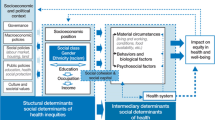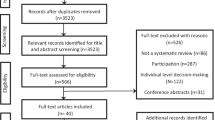Abstract
Background: Global health research partnerships are commonly led by Northern investigators who come from resource-rich research environments, while Southern partners participate with a paucity of research skills and resources. This power asymmetry within North–South research partnerships may further exacerbate the unequal distribution of benefits from the research process.
Methods: This study is designed to present the benefits and challenges of engaging in the research process from the perspective of The AIDS Support Organization (TASO), an HIV/AIDS care and treatment organization that has been involved in global health research partnerships. It uses a validated research tool entitled “Is Research Working for You?” to facilitate qualitative interviews surrounding the experienced benefits and challenges in engaging in the research partnerships as described by TASO staff.
Results: Three key themes emerged from the content and thematic analysis: 1) the reported benefits of research (e.g., evidence-based management, advocacy, etc.), 2) the challenges the research committee members face in becoming more involved in the research process (e.g., lack of data analysis skill, lack of inclusion in the research process, etc.), and 3) the institutional ambition at TASO to develop a Southern-led research agenda.
Conclusions: This is one of the few studies to document the development of a Southern-led research agenda in addition to the challenges of engaging in the research process. Mechanisms for moderating power dynamics within North–South partnerships can provide opportunities for improved research capacity and quality.
Résumé
Contexte: Les partenariats de recherche mondiaux en santé sont communément dirigés par des chercheurs du Nord issus de milieux de recherche riches en ressources, tandis que les ressources et les compétences en recherche de leurs partenaires du Sud sont beaucoup plus maigres. Cette asymétrie du pouvoir dans les partenariats de recherche Nord-Sud pourrait exacerber la répartition déjà inégale des avantages du processus de recherche.
Méthode: Nous avons voulu présenter les avantages et les difficultés de participer au processus de recherche du point de vue de TASO (The AIDS Support Organization), un organisme de soins et de traitement du VIH et du sida qui intervient dans des partenariats de recherche mondiaux en santé. L’étude utilise un outil de recherche éprouvé (Is Research Working for You?) pour faciliter les entretiens qualitatifs sur les avantages et les difficultés vécus au sein des partenariats de recherche selon le personnel de TASO.
Résultats: Trois grands thèmes émergent de l’analyse du contenu et des thèmes des entretiens: 1) les avantages déclarés de la recherche (gestion fondée sur les preuves, plaidoyer, etc.), 2) les difficultés éprouvées par les membres du comité de recherche pour s’impliquer davantage dans le processus (manque de compétences en analyse de données, inclusion insuffisante dans le processus de recherche, etc.) et 3) l’ambition institutionnelle de TASO d’élaborer une liste de priorités de recherche sous l’égide de ses partenaires du Sud.
Conclusion: Cette étude est l’une des rares à faire état de l’élaboration de priorités de recherche pilotées par le Sud en plus des difficultés de participer au processus de recherche. Des mécanismes pour atténuer la dynamique du pouvoir au sein des partenariats Nord-Sud peuvent être l’occasion d’améliorer à la fois les capacités et la qualité de la recherche.
Similar content being viewed by others
References
Slater D. Geopolitical imaginations across the North-South divide: Issues of difference, development and power. Political Geography 1997;16(8):631–53.
Bhagwati J. Ideology and North-South relations. World Dev 1986;14(6):767–74.
Reuveny RX, Thompson WR. The North-South divide and international studies. Int Studies Rev 2007;9(4):556–64.
Ansari WE. Collaborative research partnerships with disadvantaged communities: Challenges and potential solutions. Public Health 2005;119(9):758–70.
United Nations. Strengthening the Global Partnership for Development in a Time of Crisis. New York, NY: United Nations, 2009.
Jentsch B. Making Southern realities count: Research agenda design in North-South collaborations. Soc Res Method 2004;7(3):259–69.
Jentsch B, Pilley C. Research relationships between the South and the North: Cinderella and the ugly sisters? Soc Sci Med 2003;57:1957–67.
Edejer TTT. North-South research partnerships: The ethics of carrying out research in developing countries. Br Med J 1999;319:438–41.
Costello A, Zumla A. Moving to research partnerships in developing countries. Br Med J 2000;321:827–29.
Baud ISA. North-South partnerships in development research: An institutional approach. Int J Management Sustainable Dev 2002;1(3):153–70.
Wallersteing NB, Duran B. Using community-based participatory research to address health disparities. Health Promot Pract 2006;7(3):312–23.
Buchanan DR, Miller FG, Wallerstein N. Ethical issues in community-based participatory research: Balancing rigorous research with community participation in community intervention studies. Prog Community Health Partnersh 2007;1(2):153–60.
Karmaliani R, McFarlane J, Asad N, Madhani F, Hirani S, Shehzad S, et al. Applying community-based participatory research methods to improve maternal and child health in Karachi, Pakistan. Nurs Outlook 2009;57(4):204–9.
Johnson CE, Ali SA, Shipp MPL. Building community-based participatory research partnerships with a Somali refugee community. Am J Prev Med 2009;37(6, Suppl. 1):S230–S236.
Snarch B. Ownership, control, access and possession (OCAP) of self-determination applied to research. J Aboriginal Health 2004;1(1):80–95.
Nchinda TC. Research capacity strengthening in the South. Soc Sci Med 2002;54(11):1699–711.
Centers for Disease Control and Prevention. 2011. Available at: http://www.cdc.gov/ (Accessed June 5, 2011).
Medical Research Council. 2011. Available at: http://www.mrc.ac.uk/index.htm (Accessed June 5, 2011).
Moore D, Liechty C, Ekwaru P, Were W, Geralda M, Solberg P, et al. Prevalence, incidence and mortality associated with tuberculosis in HIV-infected patients initiating antiretroviral therapy in rural Uganda. AIDS 2007;21(6):713–19.
Jaffar S, Amuron B, Birungi J, Namara G, Nabiryo C, Coutinho A, Grosskurth H. Integrating research into routine service delivery in an antiretroviral treatment programme: Lessons learnt from a cluster randomized trial comparing strategies of HIV care in Jinja, Uganda. Trop Med Int Health 2008;13(6):795–800.
King R, Katuntu D, Lifshay J, Packel L, Batamwita R, Nakayiwa S, et al. Process and outcomes of HIV serostatus disclosure to sexual partners among people living with HIV in Uganda. AIDS and Behav 2008;12(2):232–43.
King R, Lifshay J, Nakayiwa S, Katuntu D, Lindkvist P, Bunnell R. The virus stops with me: HIV-infected Ugandans’ motivations in preventing HIV transmission. Soc Sci Med 2009;63(4):749–57.
CHSRF. Is Research Working for You? A Self-Assessment Tool and Discussion Guide for Health Services Management and Policy Organizations. Ottawa, ON: Canadian Health Services Research Foundation, 2007.
Thornhill J, Judd M, Clements D. CHSRF knowledge transfer: (Re)Introducing the self-assessment tool that is helping decision-makers assess their organization’s capacity to use research. Healthcare Q 2009;12(1):22–24.
Kothari A, Edwards N, Hamel N, Judd M. Is research working for you? Validating a tool to examine the capacity of health organizations to use research. Implementation Sci 2009;4:46.
Meulenberg-Buskens I. Manual for the free attitude interview technique. Cape Town, South Africa: Research for the Future, 1999.
Manji F, O’Coill C. The missionary position: NGOs and development in Africa. Int Affairs 2002;78(3):567–83.
Mosavel M, Simon C, van Stade D, Buchbinder M. Community-based participatory research (CBPR) in South Africa: Engaging multiple constituents to shape the research question. Soc Sci Med 2005;61(12):2577–87.
Schnarch B. Ownership, Control, Access, and Possession (OCAP) or self-determination applied to research: A critical analysis of contemporary First Nations research and some options for First Nations communities. J Aboriginal Health 2004;1(1):80–95.
McCoy D, Sanders D, Baum F, Narayan T, Legge D. Pushing the international health research agenda towards equity and effectiveness. Lancet 2004;364:1630–31.
Author information
Authors and Affiliations
Corresponding author
Additional information
Sources of Support: Canadian Association for HIV/AIDS Research; Canadian Institutes of Health Research.
Conflict of Interest: None to declare.
Rights and permissions
About this article
Cite this article
Muldoon, K.A., Birungi, J., Berry, N.S. et al. Supporting Southern-led Research: Implications for North—South Research Partnerships. Can J Public Health 103, 128–131 (2012). https://doi.org/10.1007/BF03404217
Received:
Accepted:
Published:
Issue Date:
DOI: https://doi.org/10.1007/BF03404217




